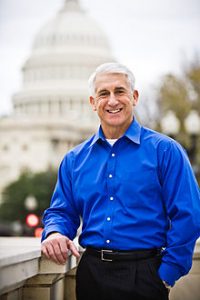
Dave Reichert
U.S. Rep. Dave Reichert (R-WA) convened a hearing on Wednesday that explored Customs and Border Protection’s (CBP) enforcement of trade laws and trade agreements.
Reichert, the chairman of the House Ways and Means Subcommittee on Trade, focused the hearing on CBP’s implementation of the Trade Enforcement and Trade Facilitation Act, commonly referred to as the Customs Bill.
The bill was enacted earlier this year to encourage legitimate trade and enhance trade laws to provide a level playing field for American businesses.
“Robust enforcement of our trade agreements and our trade laws is essential to ensuring that American businesses and workers are treated fairly by our trading partners,” Reichert said in his opening remarks. “Strong trade enforcement goes hand-in-hand with the opening of new markets through trade agreements…Today, we will have an important discussion about CBP’s efforts to implement (the Customs Bill), which, if carried out effectively, will enhance our global competitiveness, level the playing field for our businesses, and prevent our competitors from gaining an unfair advantage.”
The hearing focused on CBP efforts, Reichert explained, because CBP plays a key role in ensuring that trade laws and trade agreements are enforced.
U.S. Rep. Todd Young (R-IN), a member of the subcommittee, highlighted how important it is to negotiate new trade agreements while ensuring that old ones are enforced.
“There’s a school of thought out there, however, that we should wait to consummate any trade deals whatsoever until we fully enforce all existing trade agreements,” Young said. “What impact do you think it would have on say Indiana manufacturers, Indiana ag producers, who want to sell to 95 percent of the world’s consumers who are outside of the U.S., if we waited until we fully enforced every existing trade agreement?”
U.S. Rep. Pat Tiberi (R-OH), meanwhile, said that unfair pricing and subsidies by foreign governments have distorted the free flow of goods and services, and have made the playing field unfair for American businesses.
“To protect jobs and ensure our economy is growing, we must stop foreign competitors from cheating and undercutting our domestic producers,” Tiberi said. “That is why I testified before the U.S. International Trade Commission in May to ensure our trade laws are strictly enforced, and will continue to fight tooth and nail for fair trade.”
U.S. Rep. Tim Murphy (R-PA), the co-chairman of the Congressional Steel Caucus, said that the caucus has advanced historic trade enforcement legislation and opened new markets for American manufacturers over the last year.
“The legislation is in place, U.S. Customs and Border Protection has the tools at their disposal, but now they must continue to take action to hold foreign competitors accountable through increased detection and evasion prevention at our borders,” Murphy said. “I implore (CBP Commissioner Gil Kerlikowske) to aggressively enforce our new trade laws to the fullest extent to protect American workers from foreign cheaters.”



